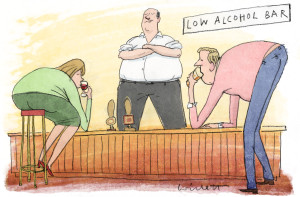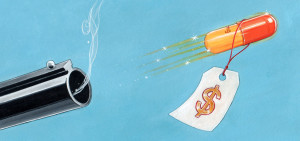•  The UK government’s responsibility deal with the alcohol industry promises to remove a billion units of alcohol (about 2% of consumption) from the market, through reducing the strength of alcoholic drinks such as beer and wine.
The UK government’s responsibility deal with the alcohol industry promises to remove a billion units of alcohol (about 2% of consumption) from the market, through reducing the strength of alcoholic drinks such as beer and wine.
The interim report from the government has been published, and claims that the deal has already worked better than promised. However, researchers from the Sheffield Alcohol Research Group at the University of Sheffield have analysed that report and believe that it is so flawed it should be withdrawn.
 • Another government incentive plan, but this time from across the Atlantic, is to increase research and development into antibiotics.
• Another government incentive plan, but this time from across the Atlantic, is to increase research and development into antibiotics.
The Food and Drug Administration will now grant a “qualified infectious disease product” (QIDP) status to novel antibiotics, which promises to increase the speed of review and simultaneously lower the bar for approval. When looking into the drugs that have come through that route, Peter Doshi wonders if this is a fake fix? He finds that the drugs approved thus far are for conditions where there are already 30 approved alternatives, with proven safety and efficacy.
 • Staying in the US, as estimates for NFL’s payout to former players who have received brain injury creeps past $1 billion, Chad Asplund and Thomas Best’s editorial looks at the mechanism of traumatic brain injury, and asks if it’s actually avoidable or an inevitable consequence of the sport.
• Staying in the US, as estimates for NFL’s payout to former players who have received brain injury creeps past $1 billion, Chad Asplund and Thomas Best’s editorial looks at the mechanism of traumatic brain injury, and asks if it’s actually avoidable or an inevitable consequence of the sport.
Duncan Jarvies is multimedia producer for The BMJ.
